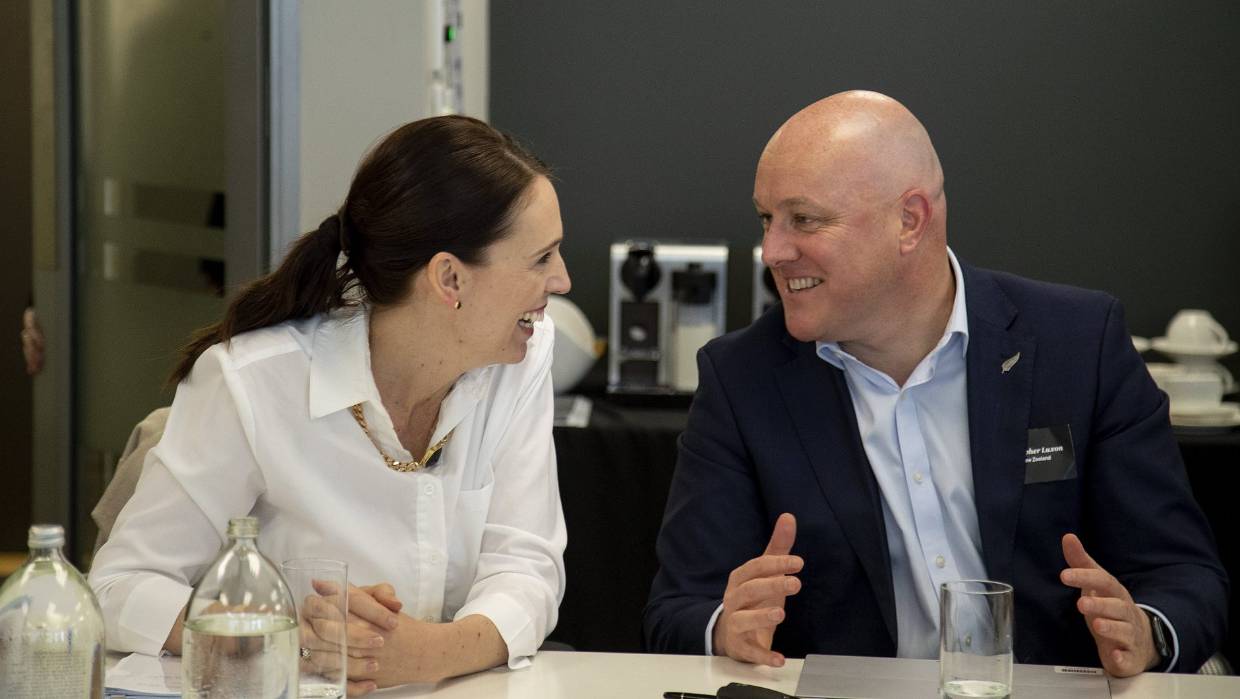OPINION
Christopher Luxon’s working relationship with the Ardern Government will come back to haunt him when voters become more familiar with the unlucky 13 who made up the Ardern Business Advisory Council.
In 2018 Jacinda Ardern appointed Christopher Luxon chair of a new Business Advisory set up to advise the prime minister after business confidence had “sunk to record lows” within ten months from when she took office.
Firms had complained about a five per cent hike in the minimum wage in April, uncertainty over new environmental and immigration regulations and fears that international investors would be spooked by a ban on many foreign homebuyers and on new offshore oil and gas exploration permits.
Reuters 28 August 2018
The role of the Council will be to build closer relationships between Government and business, provide high-level free and frank advice to the Prime Minister on key economic issues and to create a vehicle to harness expertise from the private sector to inform the development of the Government’s economic policies.
Beehive Press Release on Business Advisory Council
Christopher Luxon had already stamped the catchphrase “sustainability” on Air NZ and he repeated it with this working group, one of many set up by the Ardern Government.
“I’m excited to chair this important initiative because I think building a better, more sustainable New Zealand is a cause well worth putting all our collective efforts and energy behind,” Luxon said in an emailed statement from the Prime Minister’s office.”
Christopher Luxon on the Business Advisory Council
Mr Luxon and the prime minister will determine the full makeup of the Council and its initial work programme in the coming weeks.
Beehive Press Release on Business Advisory Council
The composition of the prime minister’s business advisory council tells a story. Additional to representing major industry groups are two business advisors – McKinsey & Co who advise businesses on adopting climate change strategy to their business model and Pango Productions who offer similar marketing advice using Maori culture.
Christopher Luxon (Chair) – Air New Zealand
Peter Beck – Rocket Lab
Barbara Chapman – Professional director (Genesis Chair)
Jacqui Coombes – Bunnings
Anna Curzon – Xero
Andrew Grant – McKinsey & Company
Miles Hurrell – Fonterra
Bailey Mackey – Pango Productions
David McLean – Westpac
Joc O’Donnell – HW Richardson
Gretta Stephens – Bluescope/NZ Steel
Rachel Taulelei – Kono
Fraser Whineray – Mercury
The group could also be seen as a parliamentary lobby group representing agriculture, food production, banking, transport, retail, manufacturing and technology, but the inclusion of these two business consultants deserves closer attention.
McKinsey and Company gained their competitive edge by providing business advice on innovating to net zero and using technology and capabilities for creating sustainable, inclusive and responsible business practices.
We are supposed to equate “net zero” with saving the planet but unfortunately the term, along with the flawed climate change model, has infiltrated NZ businesses, albeit with a completely different motivation, which is not to save the planet but to gain more market share and ultimately a bigger bottom line.
Pango Productions provides their customers with a desirable Maori cultural identity to be adopted into business strategy by forward-thinking businesses and also follows a global trend of improved indigenous rights and cultural identity.
We lead the way as independent Maori content creators across TV and Digital – making you think, feel and engage. We stand on the shoulders of our ancestors as we connect with global audiences.
Pango Productions
Why did Ardern and Luxon invite marketing companies focusing specifically on climate change and Maori culture to sit around the table with industry leaders?
Prioritising global trends to market NZ businesses is a cynical and shallow approach to business development when it is done at the expense of pursuing better quality and more cost-effective products and services. It is a strategy guaranteed to backfire if the delivery doesn’t match the promises. Ardern should have learned that lesson; has Luxon?
In the lead-up to the last election, Chris Hipkins accused Christopher Luxon of hiring consultants to produce the sole report produced by the business advisory, a report that does not appear to be in the public arena.
Luxon told a part truth but lied by omission:
It was a group of 12 CEOs and we put our own thoughts together on paper and actually presented them to the Government.
Christopher Luxon on who produced the Business Advisory Report
It’s actually quite entertaining that Luxon didn’t need to employ consultants after already installing them around the table. Someone doing Hipkins’s research should have dug a little deeper.
Can you see why it will be difficult, if not impossible, for Luxon to extract himself from the flawed climate change model and the frequently racist Maori cultural identity into business strategies? He has no choice but to continue the façade.
Any successful business owner knows that appearance ranks right up there; they also know that appearance will get a customer in the door, but that not delivering the goods will lose that same customer as quickly as looking at them. The Ardern Government couldn’t deliver the goods. The question now is whether a Luxon-led Government (cast in the same mould) can do any better.

